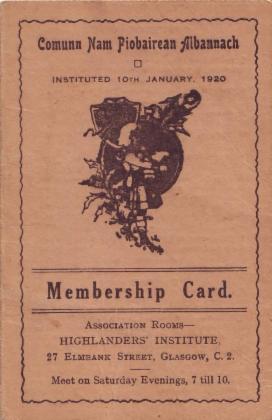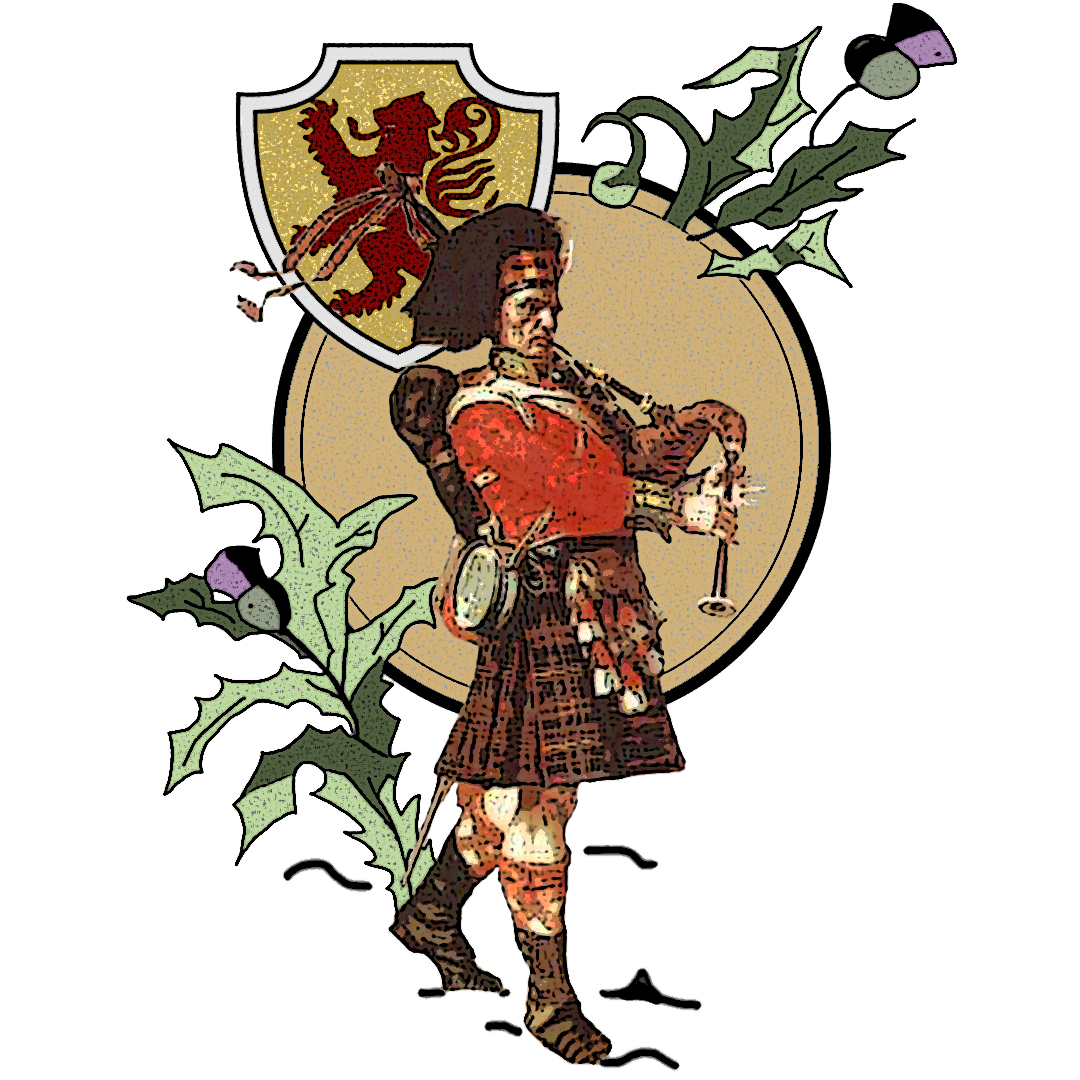History of The Scottish Pipers Association
Scottish Pipers’ Association History from the founding to 1930
In 1910 the Scottish Pipers’ and Dancers Union had been founded in Glasgow. It organised a variety of recitals, competitions and other events. One of their typical events in 1911 was a lecture on piping given by Dr. Charles Bannatyne, accompanied by recitals from John MacDougall Gillies, William Gray, James MacIvor, John MacColl and others. The war in 1914 put an end to events of this kind but afterwards many of those who had been involved before resumed their meetings on a Saturday afternoon in the back shop of the bagpipe maker Peter Henderson. John MacDougall Gillies was the shop manager and did some of his teaching there. Sometimes the popularity of the Saturday afternoon meetings could prove embarrassing, for the shop would be full of pipers who had just dropped in to meet for a chat. David Ross told of how Gillies used to disperse the crowd tactfully as opening time for the bars came near, by blowing up his pipe and playing The Men Went to Drink. These informal meetings were to become The Scottish Pipers’ Association. The twelve founder members were recorded as John MacDougall Gillies, James MacIvor, George Yardley, William Gray, Iain Macpherson, Alastair Hutcheon, Charles MacEachern, Robert Reid, George MacDonald, Archie McPhedran, William MacLean and John MacLean.
The Association was formally instituted on the 10th January 1920 and an extract from the minutes of that date shows that John MacDougall Gillies was the President, John MacKenzie was Vice President, Malcolm MacLean Currie was the Secretary and John MacLeod was the Treasurer. The committee members were James MacIvor, James Wilson, Alasdair Hutcheon, William Gray, D. Walker, H. Lothian, James Bairnett, Iain Macpherson, Robert Mann and Charles MacEachern. During 1920 the new Association held a Professional Competition, two Amateur Competitions and other events similar to those held before the war by the now obsolete Scottish Pipers’ and Dancers Union. Some of the piping trophies previously used by the SPDU were passed on to the new Association and these are still presented annually.
In the early 1920s meetings of the Club were held firstly in the back shop of Peter Henderson’s premises in Renfrew Street but before long there was not enough room there to accommodate the numbers attending so meetings moved to an empty shop in Garscube Road.


The results were:
Open Marches-
George S McLennan, late PM Gordon Highlanders, 2. John MacDonald, Glasgow Police, 3. PM R Reid 7thHLI, 4. PM William Gray, Glasgow Police, 5. John MacAskill, Glasgow Police.Strathspey and Reel- 1. George S McLennan, late PM Gordon Highlanders, 2. Angus Campbell, 3. PM William Gray, Glasgow Police, 4. John MacAskill, Glasgow Police, 5. John MacDonald, Glasgow Police.Jigs- 1. George S McLennan, late PM Gordon Highlanders, 2. John MacDonald, Glasgow Police, 3. PM William Gray, Glasgow Police.Most Points Overall- 1. George S McLennan, late PM Gordon Highlanders, 2. John MacDonald, Glasgow Police, 3. PM William Gray, Glasgow Police.Semi-amateur Piping: Marches- 1. Hugh Kennedy, Glasgow, 2. J. Thomson, Glasgow, 3. J. Keir, Alexandria, 4. Cameron Hutchison, Dalmuir.Strathspey and Reel- 1. Donald MacNeill, Townhead, 2. Ronald MacDonald, Renton, 3. A. McDermid, Glasgow, 4. A. McColl, Bridgeton, Glasgow.The Chairman for the day was John Kaid MacLean. The Association President John MacDougall Gillies died quite suddenly at his home from a stroke on the 17th December 1925, at the age of sixty-nine and James MacIvor then became the President. The meeting place was now in a small hall attached to a printer’s workshop in Thistle Street, Garnethill. James MacIvor was a master joiner in Govan and had been a pupil of Gillies and a very successful solo prize winner. He always had his silver-mounted pipes available for anyone to play. Meetings were held on Saturdays from 3 p.m. to 7 p.m. to suit out-of town members. Some of the pipers who attended regularly at this time were John MacLachlan, Alastair Hutcheon, William Gray, John Mackenzie, John MacColl, William Fergusson, William MacLean, Ronald Meldrum, lain Macpherson (Senior), Archie MacNeill (the blind piper), and Willie Barrie, who was described as a talented young pupil of Robert Reid. The 1926 Annual General Meeting which was held on Saturday 25thDecember at 9 Thistle Street was reported in the newspaper. Mr. James MacIvor, Govan was re-elected President while Pipe Majors William MacLean, John MacKenzie, Archd. McPhedran and Alex Hutcheon were elected vice-presidents. Mr. Malcolm Currie was re-elected Secretary and Pipe Major William Gray was elected Treasurer in place of Robert Mann who had retired. The President reported that the balance sheet was very satisfactory and membership was still on the increase. The annual competition held in the Pearce Institute, Govan in November had been very successful. The meeting decided to hold the annual competitions for the John MacDougall Gillies and Farquhar MacRae trophies in October and it was further decided to hold about the first Saturday in May, a competition for open piobaireachds, marches, strathspeys and reels and slow marches. At the same time there would be a competition for semi-amateurs in marches, strathspeys and reels. The competition would in all probability be held in the MacLellan Galleries. It was a long time since open piobaireachd playing was held within doors in Glasgow and many members of the Association and others who remembered the old ‘Waterloo Rooms’ days when audiences taxed the capacity of the rooms to the utmost were desirous of resuscitating the spirit of these times.
 |
SPA COMPETITION 1926
On 14thApril 1928 a competition was held at the MacLellan Galleries. There were two events for boys and girls aged 16 and under, a March and A Strathspey and Reel; three events for Professionals, a March, a Strathspey and Reel and a Slow March; and two events for Amateurs who had never won a prize in an Open Competition, a March and a Strathspey and Reel. In the professional events the prize money in the March and Strathspey and Reel events ranged from £2 for first to 5shillings for 5th. For the Slow March first was 30 shillings and 5th5 shillings. The juveniles and amateurs received medals or books or chanters. Three Glasgow bagpipe makers were among the donors with Peter Henderson giving a Silver Medal, and both R G Lawrie and Duncan MacRae giving pipe chanters. All three had advertisements in the programme as did other local businesses. Cash donations and book prizes were given by committee members. The judges were PM James Wilson 2ndBtn HLI, ex-Pipe Major D MacDougall, 8th Scottish Rifles and Pipe Major Gavin Robertson Corporation Tramway Pipe Band. Another competition was held in December 1928. Club Meetings in 1928 were still held at 9 Thistle Street but the time was now from 6pm to 9pm every Saturday. William Gray and Malcolm MacLean Currie were still the Treasurer and Secretary.
| |
SPA Competition J. McIvor, President, Committee and Prizewinners
SCOTTISH PIPERS’ ASSOCIATION 1930 onwards
By the 1930s the Club meetings had been moved to Room 7 of the Highlanders’ Institute in Elmbank Street, where meetings were held on Saturday evenings from 7 to 10pm. The competition venue at this time was the MacLellan Galleries in Sauchiehall Street. The judges were now in the open instead of under cover as in the early years. For the 1933 Professional competition The Oban Times presented a Gold Medal for the Piobaireachd and this was won for the first time by PM David Ross. James MacIvor retired as President due to ill health and from 1934 onwards Duncan MacMurchy, a native of Kintyre, took over. The 1934 Professional competition took place at the MacLellan Galleries with a record entry and PM John MacDonald MBE, Inverness as the solo judge. The organisation was in the hands of President Duncan MacMurchy, Secretary Malcolm M Currie and Treasurer Hugh Kennedy. The platform stewards were PM David Gray, Clydebank, PM D. Campbell, Airdrie and PM John MacGregor Murray. During the evening Miss Margaret Duncan sang Gaelic songs and Mr John Campbell contributed selections on the violin. John Wilson from Edinburgh won the piobaireachd playing Lament for Patrick Og MacCrimmon, David Ross was second, Roderick MacDonald, Glasgow Police was third and PM C Smith Black Watch was fourth. The March was won by Owen MacNiven, Islay, John Wilson was second, Roderick MacDonald third and Charles Scott, Glasgow Police was fourth. Peter MacLeod junior, Partick won the Strathspey and Reel, with the other prizes in that event going to John Wilson, Angus Campbell and David Ross. In 1935 James MacIvor and Dr Alex Matheson were Hon Presidents, Duncan McMurchy was the President and Donald Campbell, Philip Melville, PM Hamish McColl, Hugh Kennedy Senior and Archd. McPhedran were vice-presidents. Hugh Kennedy M.A. B.Sc. was Treasurer and Malcolm MacLean Currie was Secretary. Peter MacLeod, Partick was the composer. There were two trustees, two auditors and a working committee of another 16 members. At the 1935 Professional competition John MacDonald of the Glasgow Police won the Piobaireachd, Duncan MacIntyre won the March and Peter MacLeod junior won the Strathspey and Reel. On May 4th 1935 a special meeting took place. The occasion was the presentation of a handsome gold watch to the Hon President, James MacIvor. High tea was served and the President Mr Duncan MacMurchy, presided. He gave an interesting account of the formation of the Association. Fifteen years ago, he said, twelve gentlement, among whom was Mr James MacIvor, met in the premises of Mr Peter Henderson, Renfrew Street. That was the embryo of the Scottish Pipers’ Association which now had a membership of well over three figures. After the presentation and reply by Mr MacIvor, appreciative references were made by PM Archibald McPhedran, PM Hamish MacColl, PM David Gray, PM John MacGregor Murray, PM Malcolm MacLean Currie, Hon Secretary and Mr Hugh Kennedy Hon Treasurer. The remainder of the evening was devoted to an excellent programme of pipe music, theperformers being PMs McPhedran and MacColl and pipers John MacKinnon, Archibald MacNab, Hector MacLean, Donald MacLean, Owen MacNiven, Roderick MacDonald, Philip Melville, and Hugh Kennedy.
 |
At the 1936 Professional competition in the MacLellan Galleries on 26thDecember Robert Reid was the winner of the piobaireachd. The committee and prize winners were pictured together. From left to right they were Duncan MacMurchy, Unknown, Robert Reid, Hector MacLean, William MacLean, Unknown, Duncan MacIntyre, Peter MacLeod junior, Archie MacNab, John Allan MacGee, Philip Melville, Hamish MacColl and John MacGregor Murray. At the Amateur competition in either 1936 or 1937 the prize winners were photographed on stage at the Highlanders Institute. Competitors playing together on the stage of the Highlanders Institute. From left to right they were Hector MacFadyen (Pennyghael), Unknown, Robert G Hardie, Thomas Pearston, John Love, Unknown, I MacNab. Three of these young pipers went on to be Gold Medal winners.
 |
